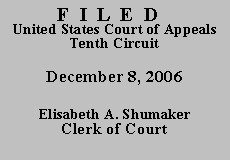

| MARCOS ANTHONY CHAVEZ,
v.
RANDALL WORKMAN, Warden |
|
Petitioner-Appellant Marcos Chavez, a state prisoner proceeding pro se, seeks a certificate of appealability ("COA") to appeal from the District Court's denial of his habeas corpus petition brought under 28 U.S.C. § 2254. See 28 U.S.C. § 2253(c)(1)(A). We take jurisdiction under 28 U.S.C. § 1291, deny Mr. Chavez's request for a COA, and dismiss this appeal.
On July 27, 1999 Mr. Chavez pleaded guilty to injury of a minor and was sentenced to life imprisonment. Despite being advised of his right to do so, Mr. Chavez did not file a motion to withdraw his plea nor did he otherwise file a direct appeal respecting his conviction or sentence to the Oklahoma Court of Criminal Appeals ("OCCA"). Not until February 14, 2005 did Mr. Chavez seek to challenge his conviction and sentence by filing a petition for post-conviction relief in the state district court. The district court denied his petition and the OCCA affirmed. On September 23, 2005, Mr. Chavez filed a § 2254 habeas petition in federal court advancing three arguments: (1) a pre-sentence investigation was not preformed and that mitigating circumstances were not presented on his behalf, (2) he received ineffective assistance of counsel, and (3) newly discovered evidence creates doubt as to whether he committed the crime. The District Court dismissed Mr. Chavez's petition as time-barred and denied him a COA. He now seeks a COA from this Court.
A COA may be issued "only if the applicant has made a substantial showing of the denial of a constitutional right." § 2253(c)(2). This requires Mr. Chavez to show "that reasonable jurists could debate whether (or, for that matter, agree that) the petition should have been resolved in a different manner or that the issues presented were adequate to deserve encouragement to proceed further." Slack v. McDaniel, 529 U.S. 473, 484 (2000) (quotation omitted). When the district court's ruling is based on procedural grounds, the petitioner must demonstrate that "jurists of reason would find it debatable whether the petition states a valid claim of the denial of a constitutional right and that jurists of reason would find it debatable whether the district court was correct in its procedural ruling." Id. The Antiterrorism and Effective Death Penalty Act ("AEDPA") imposes a one-year statute of limitations for § 2254 petitions, beginning on the date the judgment becomes final. 28 U.S.C. § 2244(d)(1)(A). Mr. Chavez's conviction became final on October 3, 1999,(1) giving him until October 3, 2000 to file his petition. Because Mr. Chavez did not file his petition until September 2005, nearly five years after the limitations period had run, his petition is time-barred. Moreover, Mr. Chavez's petition cannot be statutorily tolled for time spent in state post-conviction proceedings, see 28 U.S.C. § 2244(d)(2), because Mr. Chavez filed his state petition for post-conviction relief more than four years after the AEDPA limitations period expired. A collateral petition filed in state court after the AEDPA limitations period has expired does not toll the one-year period. See Fisher v. Gibson, 262 F.3d 1135, 114243 (10th Cir. 2001).
A petitioner may be entitled to equitable tolling of the limitations period but only when he "diligently pursues his claims and demonstrates that the failure to timely file was caused by extraordinary circumstances beyond his control." Marsh v. Soares, 223 F.3d 1217, 1220 (10th Cir. 2000). To the extent Mr. Chavez argues that he is entitled to equitable tolling because he "was unaware of the laws regarding appeal at the time of sentencing" and because his "ability to appeal this case Pro Se was accomplished by self-education," we disagree. Ignorance of the law does not provide a basis for equitable tolling. Id. ("[I]t is well established that ignorance of the law, even for an incarcerated pro se petitioner, generally does not excuse prompt filing." (citations and internal quotation marks omitted)).
Finally, Mr. Chavez suggests that certain evidence he was unaware of during the limitations period now casts doubt on his guilt of the crime charged. Specifically, he points to the fact that a highchair used by his infant son was recalled by the manufacturer and that it could have been the cause of the child's injuries. The habeas statutory scheme allows for late-filed petitions if the petition is filed one year from "the date on which the factual predicate of the claim or claims presented could have been discovered through the exercise of due diligence." 28 U.S.C. § 2244(d)(1)(D). The product recall information was released on April 13, 2000. Assuming such evidence properly would be the basis for equitable tolling, Mr. Chavez had until April 13, 2001 to file his petition under § 2244(d)(1)(D), which he did not do. We therefore agree with the District Court that Mr. Chavez "did not diligently pursue his claims."
We have carefully reviewed Mr. Chavez's brief, the District Court's disposition, and the record on appeal. For substantially the same reasons set forth by the District Court in its August 4, 2006, order, we cannot say "that reasonable jurists could debate whether (or, for that matter, agree that) the petition should have been resolved in a different manner." Slack, 529 U.S. at 484. We therefore DENY Mr. Chavez's request for a COA and DISMISS the appeal.
ENTERED FOR THE COURT,
Deanell Reece Tacha
Chief Circuit Judge
*.This order is not binding precedent except under the doctrines of law of the case, res judicata and collateral estoppel. It may be cited, however, for its persuasive value consistent with Fed. R. App. P. 32.1 (eff. Dec. 1, 2006) and 10th Cir. R. 32.1 (eff. Jan. 1, 2007).
1.Because Mr. Chavez did not move to withdraw his guilty plea, his conviction became final ten days after entry of judgment and sentence. Okla. Stat. tit. 22, Ch. 18, App., Rule 4.2.